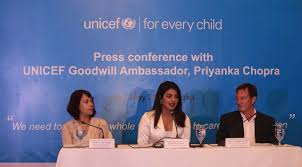Farzana
Published:2018-05-26 16:24:46 BdST
Rohingya children caring a responsibility for all: Priyanka
FT ONLINE
Unicef Goodwill Ambassador Priyanka Chopra has called for more support for vulnerable Rohingya children and women following a four-day visit to Cox’s Bazar when she met Rohingya children and families living in refugee camps and informal settlements.
“The whole world has to care and take action. Child is a child.
It’s a responsibility for all. These children have nothing,” she said at a press conference in Dhaka on Thursday evening.“It’s heartening to see the immense support that has been provided by the government of Bangladesh.
They have not just opened their hearts but have made every effort to accommodate as many refugees as they can. We have to care...”
After seeing the overwhelming images of Rohingya crisis unfolding last year, being here and especially meeting the children and families affected has made her better understand the enormity of the crisis.
Nearly 60 percent of the more than 700,000 refugees are children, living in desperately difficult conditions - without access to permanent shelter, clean and safe water, food and with limited access to makeshift settlements.
In the past four days, Priyanka has seen the incredible work that Unicef and partners are undertaking, and the progress made in these makeshift camps in the last nine months, but there is still so much more support needed.
“The kids I met were smiling but I could still see a sadness n their eyes that reflected the carnage and horror they witnessed.
Yet at the same time, meeting children at a learning centre, I saw the real hope. I saw children happy, learning and playing.”
She saw enthusiasm and children living their childhood the way it is meant to be.
“There are so many more children eager to go to school. Because of lack of space, only a fraction of these children have access to the basic education provided by Unicef.”
Chopra also went to the border area near Myanmar where hundreds of thousands of Rohingya men, women and children crossed following the escalation of violence in August 2017.
The first rains of the year hit the camps in south-eastern Bangladesh earlier this month, bringing the danger of landslides and floods to an already precarious situation.
Heavy rains and high winds are now intermittently hitting the camps during what’s known as the pre-monsoon season-before the monsoon season beings in earnest in late May or early June.
Three is a serious risk that shelters, water systems, latrines and other infrastructure could be severely damaged.
Unicef and partners are also working to prepare for the additional danger posed by tropical cyclones, which generally strike Bangladesh in two seasons, March through July and September through December, with the greatest number of storms arriving in between May and October.
In May last year, Cyclone Mora destroyed about one quarter of the makeshift shelter in Rohingya refugee camps caused widespread damage.
On the second half of the visit, Chopra learnt about Unicef’s work to support the nutrition needs of children including screening and treatment of severe acute malnutrition at a nutrition centre in Jamtoli makeshift settlement.
There are a large number of children under the age of 5, as well as high numbers of babies being born or due to be born inside the camps.
These nutrition centres offer a vital lifeline by screening and treating children for malnourishment and teaching new mothers on breastfeeding practices to help ensure these children have the best possible start in life during the critical first 1000-day period.
Chopra met many children who were being screened for malnutrition and helped doctor’s assess a child who subsequently diagnosed as malnourished.
She then visited a Unicef-supported learning centre at Balukhali where she actively participated in their lessons, games and songs.
After spending time with teachers Unicef education specialists to understand the challenges on reaching Rohingya children with education she spoke of her experiences.
“No matter where a child in from of what his or her circumstances are, every child is the future of this world. And we need to make sure they are provided the opportunity to have a future.
It’s us to us, as global citizens to make sure we show compassion to the circumstances of these children. Without education and learning opportunities Rohingya children will quickly become a lost generation. Education cannot wait,” she added.
Unicef representative in Bangladesh Edouard Beigbeder said as the crisis continues to unfold, the international community must not ignore the huge needs of Rohingya children and the new risks they face.
The government of Bangladesh has generously taken in more than 650,000 Rohingya refugees since August 25thalready and has been working with Unicef to deliver life-saving support to the most recent and previous influxes of Rohingya refugees.
Aid is also being provided to local Bangladeshis - known as the host community - in Cox’s Bazar. – UNB
Unauthorized use or reproduction of The Finance Today content for commercial purposes is strictly prohibited.


